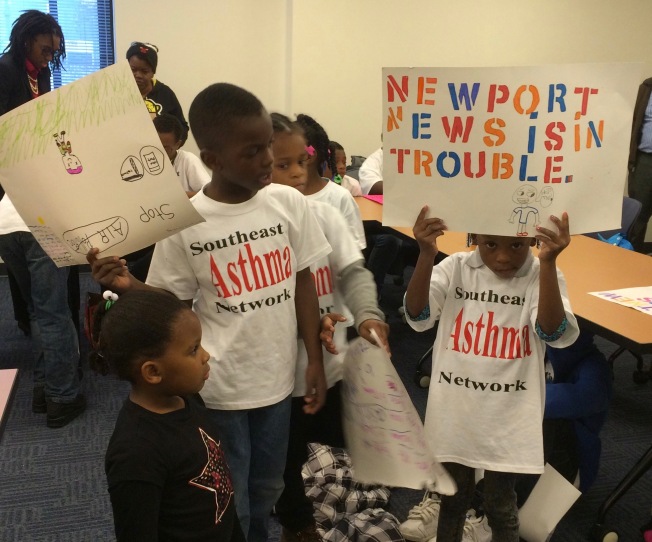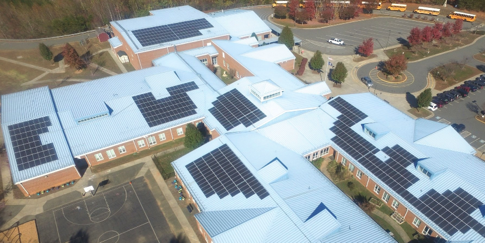Utilities and other energy companies often resist clean energy mandates and tighter environmental regulation, but they swear it’s not about their lost profits. No, it is their single-minded devotion to the public good that drives them to defend fossil fuel pollution. Only by fouling the air and water can they keep energy costs low, especially—cue the crocodile tears—for minorities and poor people. Guest blogger Kendyl Crawford weighs in with a closer look at the real effect of fossil fuels on the folks polluters say they care about.

Children from the Southeast Care Coalition make their point about the link between air quality and asthma.
By Kendyl Crawford
There is an old adage that goes, “When White America sneezes, Black America catches pneumonia.” It describes the way problems affecting the economy as a whole are magnified for African-Americans, whose place on the economic ladder is already tenuous. The same can be said for Latinos, recent immigrants, and members of low-income communities. And just as these Americans are the ones hardest hit by economic setbacks, so they are the ones who suffer most from an energy economy based on fossil fuels.
Worse, they are often used as pawns by fossil fuel companies who declare that poor people need cheap energy, without accounting for the true cost of that energy. And that true cost can be very high. Over half a million people in Virginia live within 3 miles of coal-fired power plants. Of this group, 52% are minorities and 34% are members of the low-income community. This doesn’t seem like much of a disparity until you realize that Virginia has a total minority population of 35% and a low-income population of 26%.
The fossil fuel industry has a long history of siting power plants strategically, avoiding upper class, white areas whose residents have the power and influence to be able to cry NIMBY (Not In My Back Yard). Communities with less political and economic power got stuck with the facilities—often along with other unwanted neighbors like highways, heavy industry, and waste dumps. In many cases, the communities were there first and then became the victims of zoning changes that gave the green light to polluting facilities. Residents ended up with higher environmental health burdens and lower home values, often with no compensating economic boost from the presence of the facility. The term for siting highly-polluting facilities in these communities now even has its own acronym: PIMBY, for “Put it In Minorities’ Back Yard.”
The 2014 NAACP Coal Blooded: Putting Profits before People report gave five Virginia power plants an F for their environmental justice performance, a grade based on how much a particular plant impacts both low-income and minority communities. The score takes into account the amount of sulfur dioxide and nitrogen oxides air pollution; total population within a three-mile radius of a facility; median income; and the percentage of minorities that make up the population in the close vicinity.
The NAACP report also gave a failing environmental justice performance score to Virginia’s largest utility, Dominion Resources. Dominion ranked as the 6th worst performing company in the U.S. and a “worst offender” in terms of environmental justice.
It’s not just coal. The Clean Air Task Force report Gasping for Breath highlights the fact that nationwide the oil and gas industry releases 9 million tons of pollution such as methane and benzene annually. Many of these toxic pollutants have been linked to cancer and respiratory disorders as well as increasing smog. Every summer there are 2,000 visits to the emergency room for acute asthma attacks and more than 600 hospital admissions for respiratory diseases that are directly related to the ozone smog that results from oil and gas pollution.
Not surprisingly, asthma takes its greatest toll on minorities. According to the EPA, black children are about four times more likely to die from asthma than white children. They are also twice as likely to be hospitalized for asthma. From 2001 to 2009, the asthma rate for black children increased almost 50%. African Americans, with lower rates of health insurance coverage, have fewer resources to manage these added stressors.
Latino children fare similarly poorly. Higher poverty rates and lower rates of insurance coverage mean Latino children have more severe asthma attacks than non-Hispanic white children and are more likely to end up in emergency rooms.
Of course, it’s not just minorities who suffer the harmful consequences of fossil fuels. Low-income people in general have fewer choices in where to live, have less access to health care, and often have little political power. In Virginia, this includes many residents of coalfields communities, whose families may have worked in coal mines for generations and yet have little to show for it.
Climate change will only increase the burden on minorities and low-income communities. For instance, many African American communities have historically been relegated to the least-valued land in a particular city or county, and this land is often low-lying. A recent article exposed the fact that when public housing is destroyed due to sea level rise, stronger storm surges and more extreme storms, it often doesn’t get rebuilt, forcing folks to relocate permanently.
Atmospheric warming will also lead to more health issues related to air pollution, which tends to increase with higher temperatures. But heat itself will take a toll, too, especially for those in substandard housing or who can’t afford air conditioning.
Most at risk will be those who work outdoors, among them construction workers, landscapers and farmworkers. Again, these are disproportionately minorities. Latinos make up about 48% of farm workers and almost 30% of construction workers in the U.S. As noted in the report Nuestro Futuro: Climate Change and U.S. Latinos, Latinos are already three times more likely to die from heat-related causes on the job than non-Hispanic whites. Climate change is expected to increase temperatures further. Hispanic communities are also generally located in areas of cities that are the hottest due to lack of vegetation and green spaces and the use of heat-trapping building materials.
These health impacts will be compounded by high poverty levels and low rates of health insurance. A Hispanic who is employed has less of a chance of having health insurance than a non-Hispanic person. When conditions like cardiovascular disease or diabetes are not treated and controlled, they can trigger visits to the emergency room after being exposed to extreme heat. Not to mention, language barriers can make it harder to obtain care.
Recent immigrants may also face greater difficulties following severe weather events, which are expected to increase in both frequency and intensity. Depending on their immigration status, disaster assistance may be hard to obtain or even completely unavailable.
So when utilities and fossil fuel companies urge our political leaders to keep energy costs low for the poor folks, we should recognize that what they really want is to keep profits high for themselves. They aren’t doing their customers any favors.
Kendyl Crawford is a Program Conservation Manager with the Virginia Chapter of the Sierra Club.









